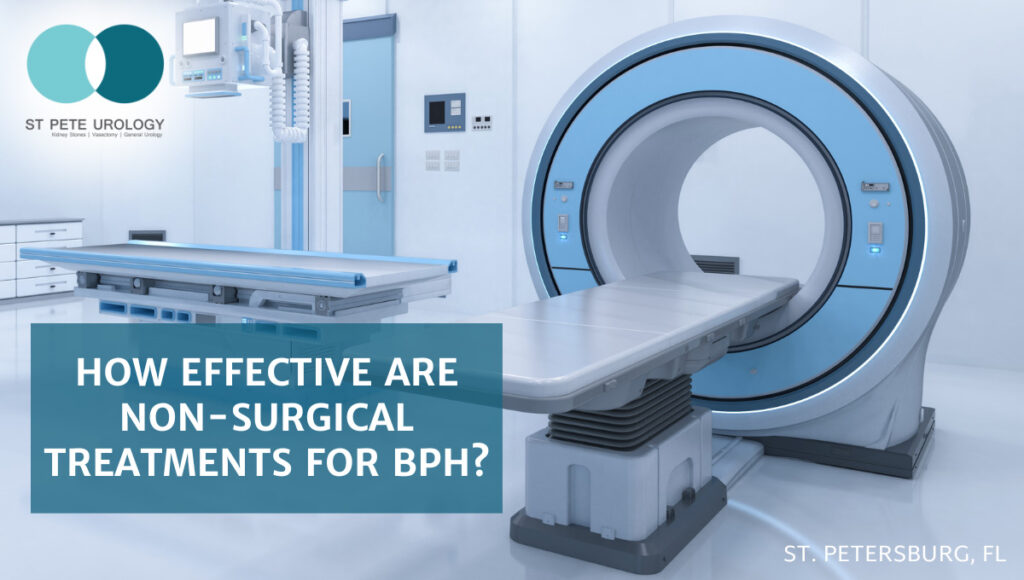Key Takeaways:
- There are two main types of prostate problems: Benign Prostatic Growth and Prostate Cancer.
- Early detection is key in managing and treating prostate cancer and should begin at age 50 (or 45 for those with a family history or higher risk factors).
- Treatment for both benign prostatic growth and prostate cancer depends on various factors and should be personalized to meet each patient’s unique needs.
Getting to Know Your Prostate
As the wise Dr. Adam Oppenheim says, “I’m a urologist with St. Pete Urology.” And who better to enlighten us on the different types of prostate problems than a seasoned professional? So, sit back and let’s delve into the world of prostate health.
First, let’s begin with some basics. The prostate is a walnut-sized gland located just below the bladder in men. Its primary function is to produce the fluid that nourishes and transports sperm. While this may seem like a small and insignificant part of the male anatomy, it can cause significant problems if not properly cared for.
Two Main Types of Prostate Problems
Dr. Oppenheim outlines two main issues in urology related to the prostate:
- Benign Prostatic Growth
- Prostate Cancer
Let’s take a closer look at each of these issues.
Benign Prostatic Growth: When Nature Takes Its Course
As Dr. Oppenheim explains, benign prostatic growth occurs when “patients have trouble urinating and they’re very bothered and often have to urinate very frequently or have a blocked stream.” This condition is known as Benign Prostatic Hyperplasia (BPH) and is a natural part of the aging process for men.
However, the symptoms of BPH can be quite bothersome, including:
- Frequent urination
- Difficulty starting and stopping urination
- Weak urine stream
- Dribbling of urine
While BPH is not life-threatening, it can significantly impact a man’s quality of life. Treatment options vary depending on the severity of symptoms and may include medications, minimally invasive procedures, or surgery.
Prostate Cancer: The Silent Threat
The second issue, prostate cancer, is a more sinister problem. Dr. Oppenheim informs us that “it doesn’t usually cause symptoms, but it can cause life-threatening cancer down the road if not treated.” This type of cancer occurs when malignant cells begin to grow uncontrollably in the prostate gland, often without any noticeable symptoms.
Early detection is key in managing and treating prostate cancer. Dr. Oppenheim suggests that men should begin screening for prostate cancer at age 50 (or 45 for those with a family history or higher risk factors). Regular screening tests, such as a prostate-specific antigen (PSA) blood test and digital rectal exam (DRE), can help identify any abnormalities in the prostate gland.
Choosing the Right Path: Customized Treatment Options for Prostate Problems
The course of treatment for both benign prostatic growth and prostate cancer depends on various factors, including the severity of the condition, age, overall health, and personal preferences. Dr. Oppenheim and the experts at St. Pete Urology offer personalized treatment plans designed to meet each patient’s unique needs.
For BPH, treatment options may include medication management, minimally invasive procedures, or surgery. For prostate cancer, treatment options can range from active surveillance (monitoring) to radiation or surgery, depending on the stage and aggressiveness of the cancer.
Conclusion: Trusting Your Prostate Health to St Pete Urology
Dr. Adam Oppenheim and the team at St Pete Urology in St Petersburg, Florida, understand the importance of early detection and customized treatment plans for men dealing with prostate problems. As Dr. Oppenheim says, “prostate health is a vital component of overall well-being, and we are here to help you navigate the complexities of this often-misunderstood aspect of men’s health.”
Don’t leave your prostate health to chance. Trust the urology professionals at St Pete Urology to provide the expertise and compassionate care you need. Schedule an appointment today and take control of your prostate health.
References:
- “Prostate disease – Better Health Channel.” https://www.betterhealth.vic.gov.au/health/conditionsandtreatments/prostate-disease.
- “Benign Prostatic Hyperplasia (BPH) – Urology Care Foundation.” https://www.urologyhealth.org/urology-a-z/b/benign-prostatic-hyperplasia-(bph).
- “Prostate Cancer: Types of Treatment.” https://www.cancer.net/cancer-types/prostate-cancer/types-treatment.
Transcription:
I’m Dr. Adam Oppenheim, I’m a urologist with St. Pete Urology.
So the prostate, there’s kind of two main issues in urology with the prostate.
There’s benign prostatic growth where patients have trouble urinating and they’re very bothered and often have to urinate very frequently or have a blocked stream.
And then there’s prostate cancer which is different and that doesn’t usually cause symptoms but it can cause life threatening cancer down the road if not treated.




